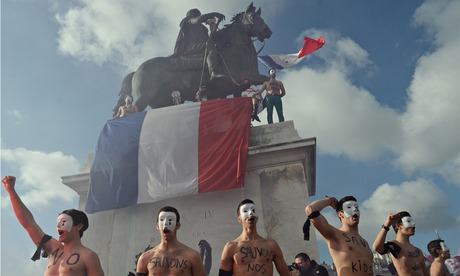http://www.theguardian.com/commentisfree/2014/feb/07/french-march-safeguard-family-values-gay-marriagePeriodically, in France, people take to the streets to protest against what they see as political interference with their own personal beliefs. Periodically, the government attempts to change the law to match current social habits better – sometimes quite belatedly, compared with the rest of Europe. Seeing themselves as permanent revolutionaries, the French sometimes forget their deep Catholic roots and the enduring conservatism that results.
This week, François Hollande decided to withdraw his own government's bill on various aspects of family legislation. The day before, huge crowds had been demonstrating in Paris and in Lyon against what was denounced as the "familyphobia" of his policies. There was no violence, no overt, rightwing extremism as had been the case a few weeks ago on "the day of anger" tainted by anti-Semitic, homophobic and racist brutalities. This time around, nice, proper families with plenty of children walked peacefully, claiming their faith in "normal" structures, un papa who is a man, a woman for maman. They loudly expressed their fears about imported gender theories creeping into the French education system and the risk of distorting sexual orientations at nursery school.
Generation after generation, the same layers of French society protest against change. They sometimes win: in 1984, François Mitterrand, the first Socialist president, had to maintain subsidies to Catholic schools. They often lose: in 1974, Valéry Giscard d'Estaing, a conservative, legalised abortion; in 1999, a Socialist government put in place a "civil union", intended to protect homosexual couples – it has, in fact, been primarily used by heterosexuals who resist marriage.
This time around, the protest runs deeper. The gay marriage bill, which was passed last year, stirred up concerns way beyond the usual political battleground. Polls show it is supported by 60% of the public, and thousands of such marriages have been celebrated peacefully. But scars are still bleeding in a society destabilised by unemployment, globalisation and multiculturalism. Tradition also has supporters of a new kind: well-integrated French Muslims, fighting for values, they say, that are similar to Catholic ones when it comes to sex and family.
More importantly, the current movement does not fit any clear-cut political pattern. On the left, some MPs denounce Hollande's "surrender to the reactionaries" and worry about losing support from vociferous constituencies in the forthcoming local elections. But there is also unease, if not hostility, to reforms in reproductive law at a time when it is important that economic priorities must not be jeopardised.
On the right, the UMP party didn't see anything coming. Destabilised by internal fighting, traditional conservatives are divided over these issues and obsessed with the rise of the extreme right. They have not been able to take political advantage of other – and new – forms of social unrest, like Les Bonnets Rouges in Brittany, where low-earning voters made their anger at the Paris elites felt. The Front National is more in tune with the new anti-establishment sentiment. Yet Marine Le Pen, its leader, has been conspicuously silent about the latest protest movements. She and her cronies were out of sight last Sunday: she is cautious about surfing the wave and risking being accused of homophobia.
What is actually at stake in France is the rise of a kind of Christian populism that traditional politics no longer channel. Unlike the Tea Party in the US, it has not sprung from the bellies of the UMP. It does not correspond to specific geographical or sociological reservoirs of discontent. True to the French tradition, it does not dismiss the state as the ultimate referee and protector. Rather, it claims there is a space where citizens become more legitimate than their elected representatives, where the majority rule does not apply, where political democracy, in short, is failing. It is a phenomenon to worry about far beyond the idiosyncrasies of French politics.
